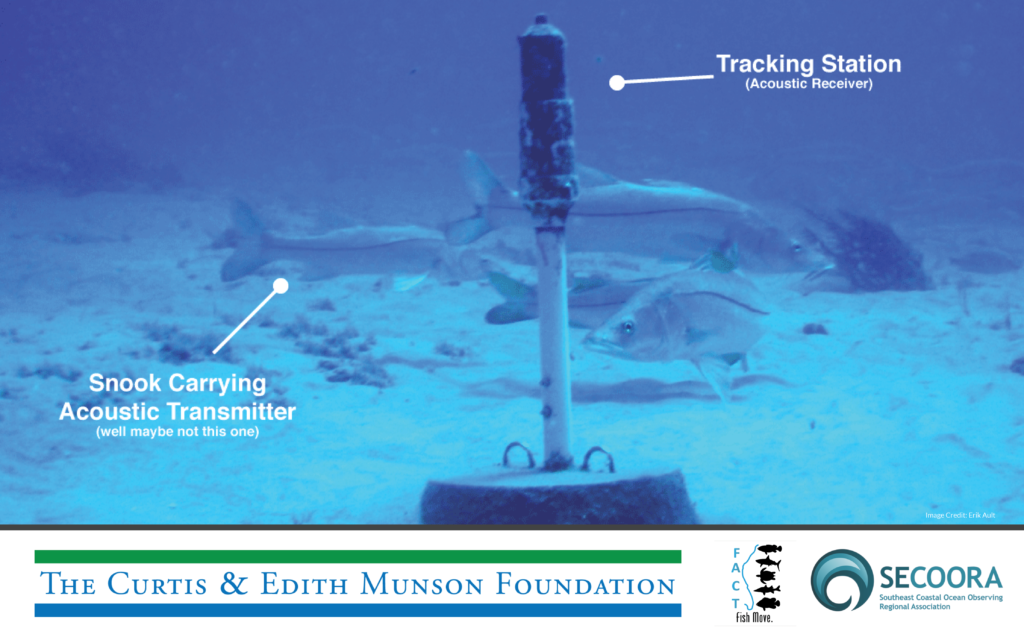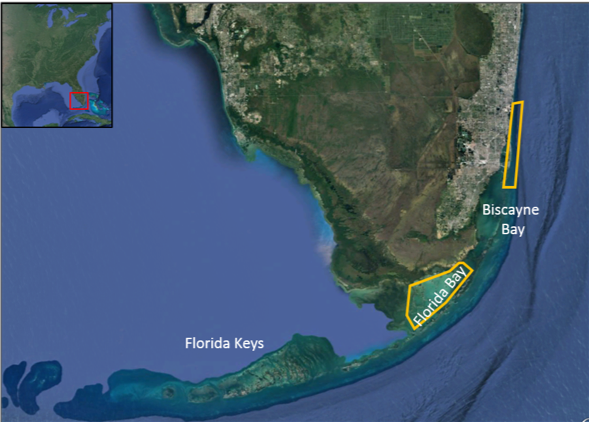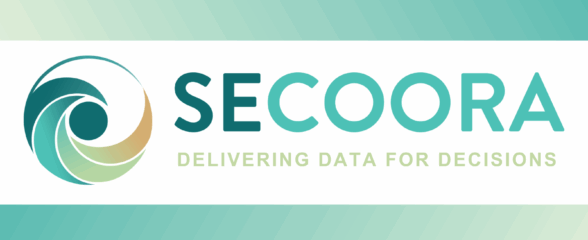
SECOORA received $15,000 from the Curtis and Edith Munson Foundation to support fisheries research in South Florida. But there is a catch – we need to raise $15,000 in matching donations. These donations will be used to support a graduate student and purchase equipment to support their research.
Help us reach this goal and donate today, knowing every dollar you contribute will be matched! Click here to donate.

The Issue and Proposed effort
In South Florida, scientists use acoustic telemetry to track the movements of important species such as sea turtles, tarpon, permit, sawfish, cobia, and nurse sharks. Animals are tracked using stationary underwater devices called receivers. These receivers are found in coastal waters throughout South Florida from Biscayne Bay down to the Florida Keys and into the Everglades.
Funding from the Curtis and Edith Munson Foundation is allowing SECOORA and the FACT Network to purchase and deploy water temperature loggers at acoustic receiver locations. Water temperature data will provide fundamental information to help our understanding of how temperature impacts fish habitat use and the development of predictive models of temperature dependent fish behavior, model validation for hurricanes, and coral reef response to water temperature.
The Challenge
We need your help to raise $15,000 in matching funds. With these matching funds, a graduate student will be supported to coordinate the collection of the data from the temperature loggers and purchase acoustic sensors to tag fish. All this vital information will be incorporated in a research project. Make your tax-deductible donation HERE.
What is passive acoustic telemetry and why is it important?
Passive acoustic telemetry is a technology that allows scientists to track aquatic animals over large distances. Electronic tags that emit a unique code are surgically implanted or attached to an animal. When a tagged animal swims near an underwater receiver, the unique code, date and time are recorded. Scientists download the information from the receiver to identify which tagged animals have been in the area.
The tags can last several years, allowing scientists to examine changes in movement patterns over time. Using this, they can look at the animal’s responses to different events such as storm systems or rising ocean temperatures.
Acoustic telemetry is an important tool for researchers and managers to effectively conserve and manage aquatic animal populations for future generations.
Donate – Help us Reach Our Goal
Please donate here! We need to reach our goal to match $15,000 from Curtis and Edith Munson Foundation by November 2019. Funding will be used to support a graduate student and purchase acoustic tags. This will fill research gaps and enhance our understanding of how temperature is impacting both our South Florida fisheries and critical habitat. All donations are tax deductible.
SECOORA Tax Info
SECOORA is a 501(c)(3); all donations are tax deductible. SECOORA’s is Tax ID 26-1215705. Donations can be made via this page or by mailing a check to SECOORA.
Mailing information: Support a Student to Research Fisheries in South Florida
SECOORA
Attention: Munson Award: Support a Student
PO Box 13856
Charleston, SC 29422
Related news

Plankton Perfect: Using Imagery to Document Microscopic Marine Life
Dr. Enrique Montes is working to understand how plankton respond to changes in the ocean by capturing high resolution imagery with advanced technology. This work is funded by the Marine Biodiversity Observation Network (MBON) to use novel techniques like the Continuous Particle Imaging and Classification System (CPICS).

SECOORA Community Spotlight: Craig Harris
When Craig Harris signed on as the Emergency Management and Resiliency Coordinator for the city of Wilmington, North Carolina, he brought with him knowledge of water level sensors. SECOORA worked with Craig to install a water level sensor at the Love Grove Bridge in Wilmington, a site prone to flooding.

SECOORA Funding Opportunity Announcement: Letters of Intent Solicitation
SECOORA will submit a coordinated regional proposal in response to the anticipated FY 2026 Implementation of the U.S. Integrated Ocean Observing System (IOOS) funding opportunity. Letters of Intent to be considered for inclusion in SECOORA’s full proposal are due September 9, 2025.